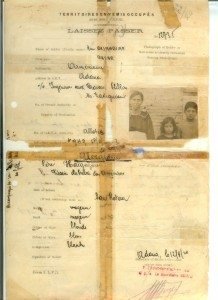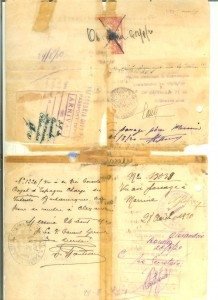Special for the Armenian Weekly
My maternal grandparents were from Dikranagerd (or Tigranakert, now Diyarbakir), where my mother Mari and uncle Mgrditch were also born.
My recollection of my grandmother Gadar growing up in Cairo was that of a kind, gentle soul, a very sad person who spoke little, constantly wore black, and always held a cross in her hand. She slept little, woke up early every morning, prepared my breakfast, and on my way to kindergarten kissed my forehead and murmured a short prayer. She would go to the Armenian church in our neighborhood of Bein El Sourein (the church has been demolished to widen the street) for morning prayers and regularly attended Mass every Sunday. On some Sundays I accompanied her. After Mass, my grandmother would get together with other ladies her age, all wearing black, holding hands and whispering while my friends and I played in the church yard, oblivious and unaware of their pain.
After Mass, my grandmother would get together with other ladies her age, all wearing black, holding hands and whispering while my friends and I played in the church yard, oblivious and unaware of their pain.

I was very young; this was the late 1940’s, early 1950’s. I did not know anything yet about the genocide. At that time in Egypt, little was said or mentioned about the genocide. It was in the late 1950’s that the Armenian community in Egypt (primarily the ARF and the Ramgavar party) started to openly commemorate the genocide. When I asked my father and mother why my grandmother always seemed to be sad and wore black, my dad’s answer was, “She survived hell on earth and is unable to forget.” Being young, I could not comprehend my grandmother’s grief and the enormity of her family’s suffering.
My grandmother passed away. As I grew up, I was very fortunate to have great and inspiring teachers like Sarkis Zeitlian and Berj Momdjian, who made us aware of who we are and have become today. I also had the “Houssaper” and “Ararat” centers, which in our childhood and as adults became our second homes.
When my father passed away, I found a document in his papers. I am extremely happy that my father had kept it for so many years. It is a document that cries out about what grandmother, mother, and uncle had gone through at the murderous hands of Turks and Kurds during the genocide.
When Dikranagerd’s Armenian community was viciously attacked and looted by the Turkish/Kurdish hordes, all the able-bodied males were either massacred or deported en masse. Their properties were looted or confiscated, and the women and children were exiled. The Basmadjian clan was perished, although I became aware that few of them had miraculously survived and made their way to the United States.
Unfortunately I still do not know how my grandmother, with her two children, was able to make the treacherous journey from Dikranagerd to Adana. How did they survive in those hostile and venomous conditions, with nothing except the clothes on their backs?
Unfortunately I still do not know how my grandmother, with her two children, was able to make the treacherous journey from Dikranagerd to Adana. How did they survive in those hostile and venomous conditions, with nothing except the clothes on their backs?
Following World War I, the Franco-Turkish war was fought and Cilicia and cities like Adana were occupied by French troops from November 1918 to October 1921. Armenians in the “ French Armenian Legion” were fighting alongside the French and supporting them. There is voluminous historical data in the French archives about that period and the involvement of the French, but very little from the Armenian perspective.
It is likely during that time that my grandmother, mother, and uncle, with the help of a “guardian angel,” were able to reach Adana. I have no idea what happened in Adana, except that they sailed on a ship to Alexandria, Egypt.

The document, in French, is revealing for the following facts:
It was issued by the Military Governor of the “Occupied Enemy Territories” on Aug. 12, 1920.
It is a “Permit of Passage.”
Nationality is noted as “Armenian.”
Destination: “Alexandria in care of Father Haigazoun.”
With “No return.”
They arrived in Alexandria on Sept. 3, 1920. They were taken in and taken care of by Armenian families who were in Alexandria at the time. My father was one of them.
My grandmother could not forget. How can I?
This document cries out for Justice.


I am an offspring of that BASMADJIAN CLAN’s survivers.I am the president of the ARMENIAN COMMITTEE OF CANADA.I mean some of us SURVIVED,cousin
A document that definitely cries out, but also makes all of us cry.
It is simply amazing that the document has been kept for 95 years.
It is proof positive of the Genocide and the mass deportations that was perpetuated by the Turks.
It is also a testimony of the strength and will of the Armenian Mother who was able to protect her two children.
Bedo
Indeed. Justice needs to be served, and served by us, not by others.
We need to find the means and the ways to deliver it. Not an easy task but doable. I quote: “Yerp chi mnoum elk ou jar khentern en kdnoum hnar”. Translation: Just when we think all is lost or impossible, a way out will be found.
Excellent article, great generation of Armenian mothers and grand mothers .They build a Nation . Stories have to be told ,until Justis is done to Armenian Nation
Excellent article.
The Ottoman Turks attempt to annihilate us Armenians failed.
Yes Armenians have been dispersed around the world. Our grandparents fled and sought refuge in any country that would accept them. Today almost 100 years after the Armenian Genocide the grand children of those who survived, around the world have risen to proudly take their places in every field, from business to art etc…etc.
We are still here and we are here to stay.
The Genocide had and still has an after-effect on each Armenian. We all have lost ones and survivors. I share the views of other commentators above. In addition and more significantly I consider our generation to be the lucky ones. Our parents, our teachers and the environment in which we grew up is in fact responsible for “what we are” … Vart eloquently highlights our indebtedness towards them. As to the political facet of the article it begs the question “Why did France give away to Ataturk the Cilicia, a region for which like Syria and Lebanon France had the mandate? The French archives of that period are available in Nantes (France). For me the results of the research have not given a clear answer to the “why”. This is a question similar to as to why did the US Senate in 1919 refuse the Mandate for Armenia? Why indeed? Whether there is a valid reason or not is immaterial. Like the generation before us, our generation and the generations to come the continued struggle remains our “mandate”.
I had tears in my eyes reading “The Armenian Genocide Commemoration to take place in Diyarbakir”. This must be a very emotional event for those who will attend, and the grandchildren of Dikranagerdsis,
who still remember their grandmothers, their Gadars, who lost their families in Digranagerd but somehow, by some miracle help, were able to make it to other shores.
This brings me to “Remembering Susan Wealthy Orvis”. What a remarkable story of dedication, selflessness, sacrifice and pure guts and courage. I have to imagine, that somewhere along the treacherous road from Dikranagerd to Adana, there must have been another “Susan” who helped my grandmother and her two children, whose story has yet to be told.
Vart Adjemian
I have known Vart for over 15 years working with him and for him.
Having been born and raised in Utah, I did not know about Armenians and the Genocide. Indeed until recently, I would say few Americans in my part of the world knew.
Vart is very proud of his heritage and becomes very emotional when he talks about the Genocide. I learned a lot from him about business management, but also learnt and became aware that a crime committed has not been recognized or acknowledged .
In the past few weeks, with the Pope’s declaration, and worldwide press coverage of the upcoming Centennial, I was content to see that Vart’s dream of universal recognition of the Armenian Genocide is gaining momentum and might become a reality.
His article is very touching, written from the heart . Now I can understand appreciate the pain in his eyes when hoe talked about the Genocide.
Mike Hoer
It is extremely important and critical that Armenians worldwide become aware of the establishment of the “Armenian Legal Center for Justice” and the legal process they have embarked on to have reparations for properties that were illegally stolen during the Genocide.
However, ALC needs documentation. Any descendant of a genocide survivor that has any type of documentation that can prove ownership of property should visit
https://armenianlegal.org/document-preservation-form
This is a critical and most worthy huge endeavor.
For it to be successful, which is my opinion is more important than recognition, as legal actions can lead to recognition, full support is imperative.
For more information, also visit the website of ” Armenian Legal Center for Justice”.
Be supportive;
Vart Adjemian